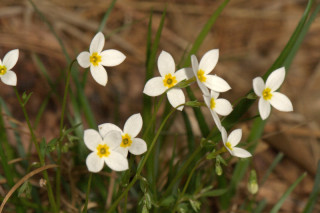
May-2013
Check out this link (Science Daily) to find one more reason to fight for the preservation of herbaria! Fortunately, the Dean of my School sent this along to me with the message – “Herbaria rock!” The piece is called “‘Whodunnit’ of Irish Potato Famine Solved.” Herbarium specimens were used to discover the strain of potato […]
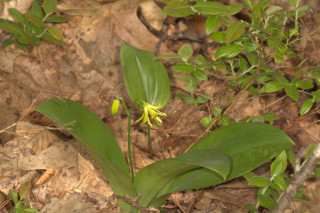
May-2013
Clintonia borealis (Ait.) Raf. is a lovely lily that Luke and I found growing on Pack Monadnock. The species is clonal, and once established a community of close can survive for 10 or more years. Seed set and seedling establishment has actually been shown to be very low in this species. This is why it […]
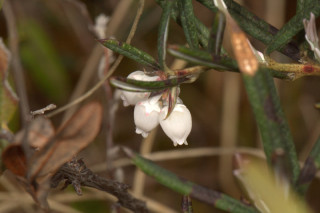
May-2013
Andromeda polifolia L. is not called bog rosemary because the leaves of the plants smell spicy…like rosemary. The leaves do, however, superficially resemble rosemary. I do love the upside down, urn-shaped flowers of bog rosemary. This is a “buzz-pollinated” species, meaning a bee has to buzz below the opening of the flower in order for […]
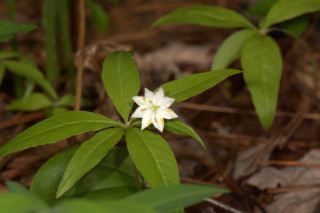
May-2013
Lysimachia borealis (Raf.) U. Manns & Anderb. (formerly Trientalis borealis) is a common herb found on the forest floor in New Hampshire. The flowers are small and delicate and are pollinated by Syrphid flies (Barrett and Helenurm 1987). The species is easy to recognize because of its whorled leaves and flowers with usually seven petals; […]
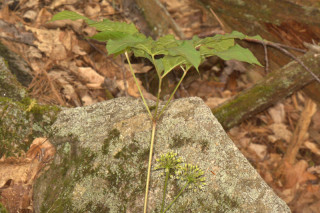
May-2013
Aralia nudicaulis L. is a small herb/shrub found in forests throughout New England and is widely distributed in North America. This is the only species in Aralia sect. Nanae. It is dioecious. Pictured here is a male plant; males possess more flowers per umbel than females. The species is sexually dimorphic. This species is pollinated by […]
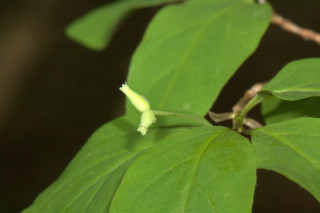
May-2013
Lonicera canadensis Bartr. ex Marsh. is a woody shrub found in the northern United States (east of the Dakotas). Approximately 13 species of Lonicera are found in New Hampshire, and most of them are nonnative invasive plants. One should be careful about planting a Lonicera in the yard or garden; check Go Botany to make […]
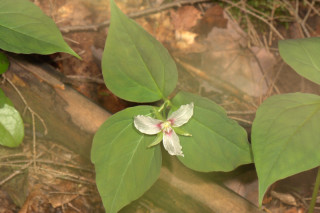
May-2013
Luke and I found Trillium undulatum Willd. growing on a rocky, forested slope in the Purgatory Falls area of New Hampshire. A study by Zeter et al. (2001) indicates that the seeds of T. undulatum in North Carolina and South Carolina are dispersed by yellow jackets. What an interesting seed disperser! I wonder if the […]
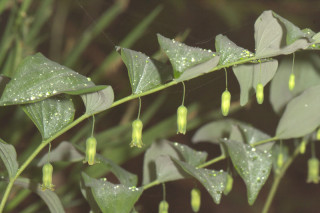
May-2013
Polygonatum pubescens (Willd.) Pursh is a common small herb along forested paths in New Hampshire. The flowers can occur singly at each node or in pairs, as seen in these photographs. The leaves, as the scientific name implies, are very hairy. Thoreau writes in his rediscovered last manuscript, Wild Fruits, “This is a delicate plant […]
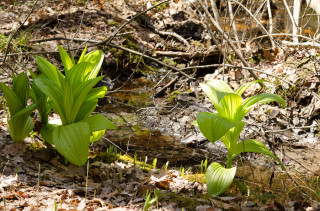
May-2013
If you haven’t seen any of Chris Martine’s videos in the “Plants are Cool, Too!” series, you are really missing out. I love the one featuring the Pale Pitcher Plant. Also check out his most recent video featuring Skunk Cabbage.
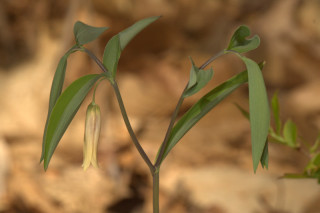
May-2013
Uvularia sessilifolia L. is a common, small, herbaceous plant occurring along forest edges and in forests. It would be cool for someone to study this species in more detail, as I couldn’t find published information (I searched the Web of Knowledge) on the reproductive ecology of the plant. This plant, and all the members of […]
